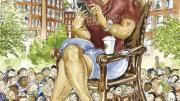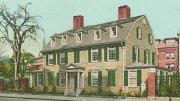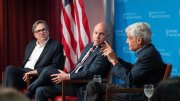On the occasion of Harvard’s 350th anniversary, this magazine asked diverse alumni to pose a question to themselves, and answer it. Some of the resulting soliloquies, published in the September-October 1986 issue, were personal in nature (how to live a good life, how to rear children); tactfully, we have not inquired into how matters turned out. But other respondents raised external issues and hazarded guesses about the world to come. Appraising their predictions seems fair game, as does testing other forecasts—to ward off hubris, or at least induce healthy skepticism about any crystal-ball-gazing appearing in this 375th anniversary edition.
• Armageddon. With the Cold War still very much a war, and the Soviet Union mired in Afghanistan, long-time New Republic columnist Richard L. Strout ’19, professor emeritus David Riesman, and John G. Dow ’27, of Americans Against Nuclear War, all worried deeply about what Strout called “nuclear meltdown” (of the belligerent kind) and Riesman “nuclear winter.” He lamented Harvardians’ “lack of reaction” to the threat. Today, the heated U.S.-U.S.S.R nuclear competition has cooled considerably. And the Harvard Kennedy School’s Belfer Center and Dillon professor of government Graham T. Allison Jr. have long provided leadership on disarmament, control of nuclear materials, and counterterrorism measures. But as Riesman soberly noted, the “creation of nuclear arsenals in Israel and Pakistan” (and India and perhaps elsewhere) poses a continuing, deadly threat.
• Terrorism. Appraising a rash of bombings and other incidents, New York Times columnist Anthony Lewis ’48 wrote: “Terrorism has us in its psychological grip” as, around the world, “millions have turned from politics to religious visions that we consider fanatic.” Attorney Bartle Bull ’60, LL.B. ’64, decried a lack of historical understanding: “Americans read the sports pages with more pleasure and intelligence because we know the details of our teams’ histories, but we follow international terrorism without understanding its sources.” They seem sadly prescient about the terrorist attack of 9/11—and about some of the reactions to it, in the United States and worldwide, during the past decade.
• The U.S. economy. In the wake of Ronald Reagan’s reelection, lawyer, activist, and author Phyllis Schlafly, A.M. ’45, noted approvingly, “We have lost faith in the ability of government to solve our problems. We have developed a new appreciation of how a free, private-enterprise economy (with lower taxes and less regulation) can accomplish more than can be achieved by expert planners.” Score that a tie, perhaps: after the 2008 financial crash and Great Recession, the country seems evenly split, in the summer of 2011, between voters who loathe their government and those who mistrust the financiers and business managers piloting jobless recovery.
• The world political economy. Robert Coles, the professor and child psychiatrist, imagined that “Western capitalism and the state socialism of the East will have, by then, moved toward one another in certain ways: more entrepreneurial spirit in Moscow as well as Peking, and more concern for the trials and burdens of the poor, the vulnerable, in the noncommunist world.” It’s more like robber-baron spirit in Moscow now, a melding of Ayn Rand with party control in the rocketing People’s Republic, and ambivalence toward the costs of social welfare in the West. (As for other convergences, John King Fairbank, dean of the China hands, wisely warned, “[H]uman rights may be a universal aspiration but in different cultures they may be institutionalized in different forms.”) As events in Somalia prove, Coles’s hope for an end to famine remains desperately unfulfilled.
• The environment. Erich Segal ’58 (of Love Story fame) thought “our generation will be weighed in the scales and found wanting” for polluting Earth. He cited nuclear waste and toxic chemicals, but wrote nary a word about global warming.
• Oversights. At the dawn of the digital era, no one mentioned the Internet. Medical issues arose in passing (an essay on AIDS, another touching on aging and the increasing use of equipment in care), but the life-sciences revolution went unremarked. No one foretold the dissolution of the Soviet Union (quite the contrary), nor the gathering economic momentum that might well lead China to surpass the United States, well before 2036.
• The University. In a separate extended essay, subtitled “Does Harvard have a future?” historian Oscar Handlin, then Loeb University Professor, mourned the passing of the pure (gentleman) scholar of yore. At its 300th anniversary, he wrote, Harvard’s president was assisted by “a handful of administrators,” sufficient to the task. By late in the century, he saw an institution whose scholars had grown farther apart, more specialized, more distant from scholarship for its own sake, in a larger, more layered enterprise that, “like other colleges and universities which had to appeal for public support, advanced the idea of utility”—through training citizens or creating products that “added to the nation’s health, wealth, and beauty.” Nothing in the quarter-century since has bent the trajectory of higher education that Handlin outlined.
• Harvard Magazine. For that 1986 anniversary issue, photographers prowled campus, their cameras “loaded with Kodachrome 64.” Processing ceased this past January. And, understandably giddy when they sent their record 256-page edition to the printers, the editors conjured up successors who might “put out an even fatter issue at the 400th anniversary in 2036.” Perhaps. Or maybe it will be beamed wirelessly to readers’ inner eyelids: may we patent “Blink to Link” publishing?









